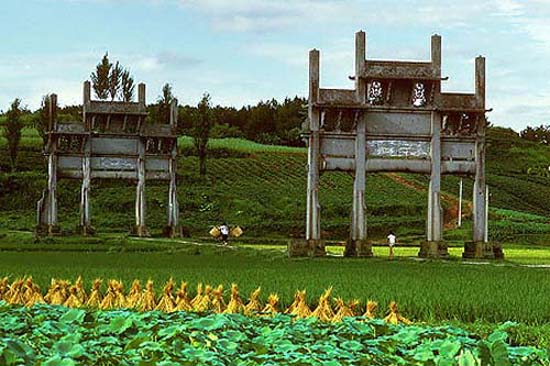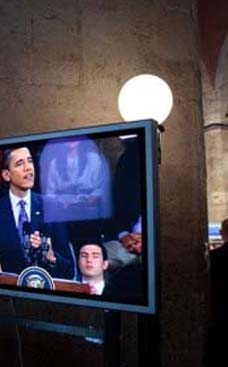
"I posted a blog several months ago about the ability of volunteers to hire a housekeeper to clean their apartments on their Peace Corps salary. The reaction from Peace Corps Washington was swift and I was made aware that certain people were unhappy that I was telling the truth. But Peace Corps Washington doesn’t know our China any better than I know Peace Corps Kenya. They don’t understand our challenges, even if they have been compiled in a nice little memo and presented at a meeting. Besides, the idea of volunteers getting a housekeeper is limited to only a couple volunteers that I know (though the service is accessible by anyone). I think Peace Corps is a little like the Chinese government - afraid of a spokesperson who might paint a negative picture. The image of China as a rapidly developing country somehow destroys that old notion of Peace Corps being about dire poverty and struggling to survive (and how Americans will help those people overcome their struggles). It’s like nobody realizes that change happens, and they cling to the perception that Peace Corps is about crushing poverty and never-ending illness."
It’s been going around for a while now in China – this notion of Posh Corps
Posh Corps China
from Peace Corps Worldwide Master Site Feed by Dustin Ooley
“This ain’t your momma’s Peace Corps.”
-Angie McHodgkins; RPCV China 2006-2008
It’s been going around for a while now in China – this notion of Posh Corps. For better or worse it has become a meme, and it is alive in the hearts and minds of many volunteers in China who wonder why we are here.
But who is, “we?” The ‘smaller’ cities of Lanzhou and Guiyang are very different from Chengdu and Chongqing, which are both different from all the rural sites throughout China.
I questioned former groups of volunteers about the name but they hadn’t heard it until years after service. Many of the first volunteers in China didn’t face the same influx of foreign teachers, and were less likely to question the legitimacy of their roles as foreign teachers. Mike Meyer, a Peace Corps China 3 Volunteer, expressed his surprise at the changes after coming back to visit his site and seeing the school’s ability to hire other foreign teachers.
“Peace Corps China should be in middle schools in poor counties that do not have the resources or access to American teachers. Then again, Peace Corps China never felt much like a development program, but a political and cultural one. I’d like to see more in the direction of development, because despite massive improvements, the Chinese countryside largely remains in the Third World.”
For more recent volunteers teaching alongside paid foreign teachers, there is an onus for self-justification to prevent madness. None of the China volunteers is struggling to survive the elements or isolation like other Peace Corps countries - more often we are caught in an existential crisis. This becomes even more significant for volunteers who work in large cities like Chengdu and Chongqing.
My college is rural enough to be just on the edge of poverty. I see it daily outside the walls of the college. I see it behind the eyes of staring peasants wandering down the streets with cabbage hanging from their shoulder poles. Children playing with sticks wander the college in search of plastic bottles to sell. They are happily packing their cheap plastic bags of bottles, dressed in grubby clothes. I pull an empty bottle from my bag and a boy smiles broadly before stuffing it into his bag wordlessly.
On the crowded bus a woman propped a large bag of rice against the wall in a standing area. Before she got off the bag had spilled on the floor and she had lost perhaps a quarter of it. She was too embarrassed to do anything but gather up the bag and her basket before quickly disembarking. By the next stop an older woman was gathering up the spilled rice, while explaining to everyone in Chinese, “I can clean this and it will be ok to eat.” This is her explanation in a country where people are so afraid of getting disease from the ubiquitous spit on the ground that they refuse to set even a book-bag down. Most people refuse to sit down on the curb. If there is no newspaper to serve as an intermediary, they will squat. Tuberculosis looms.
The poverty of Guizhou is often a hidden poverty because most of this poverty is not desperate. Instead it’s people who simply cannot afford anything extra. It’s people without health care who have yet to feel any real “trickle down” from the super wealthy coastal cities, which have the means to export goods. It is a poverty of a fatalistic people whose solution to bitterness is almost too easy: just swallow.
But those volunteers who live in large cities struggle to reconcile their existence with omnipresent wealth. One Chongqing volunteer, Philip Razem, says that he is, “training China’s future leaders.” He argues that he is accomplishing the first goal by injecting critical and creative thinking into his lesson plans. He keeps a blog about his experiences. China is a place where we classify cities by a western restaurant algorithm – where cities like Chongqing and Chengdu score high and Bijie and Tongren score low. I suspect places like Starbucks and Pizza Hut actually have no idea how many franchises they have in Chongqing.
The Peace Corps is not too happy that I have shared the realities of our situation. I posted a blog several months ago about the ability of volunteers to hire a housekeeper to clean their apartments on their Peace Corps salary. The reaction from Peace Corps Washington was swift and I was made aware that certain people were unhappy that I was telling the truth. But Peace Corps Washington doesn’t know our China any better than I know Peace Corps Kenya. They don’t understand our challenges, even if they have been compiled in a nice little memo and presented at a meeting. Besides, the idea of volunteers getting a housekeeper is limited to only a couple volunteers that I know (though the service is accessible by anyone). I think Peace Corps is a little like the Chinese government - afraid of a spokesperson who might paint a negative picture. The image of China as a rapidly developing country somehow destroys that old notion of Peace Corps being about dire poverty and struggling to survive (and how Americans will help those people overcome their struggles). It’s like nobody realizes that change happens, and they cling to the perception that Peace Corps is about crushing poverty and never-ending illness.
My own opinion about being in China is that the rural volunteers are helping people who wouldn’t have it otherwise. China is actually comprised of two countries: the coast and everywhere else. According to Wikipedia, Guizhou’s GDP compares to that of Kenya (I always wanted to say, ‘According to Wikipedia!’). Despite the recent development of China’s western provinces, and the ability of schools to hire more foreign teachers, the country needs people who aren’t going to evangelize. China’s desperation for foreign teachers has led to a don’t ask, don’t tell policy about missionary teachers. This, in turn, has led to a skewed perception of Americans as a superstitious, evangelical people. My students are stunned when I tell them I don’t believe in God. Our presence as Americans who try to learn the language and do our best to help students in a variety of ways without the ulterior motives of business or religion makes us, in some sense, more respected. And this leads to an enhanced ability to accomplish all of our goals.
I never intended this to be a defense of Peace Corps’ presence in China, but I want people to understand the issues China Volunteers face. I’m writing this in a two-bedroom apartment. I have a heater and access to the Internet, though neither was working last night when the power was out. I can’t drink the water, but I can make a phone call to have a large water-cooler bottle of drinkable water delivered to my door (or I boil my water like any other PCV). Despite the wealth of China, the realities of poverty are overwhelming. The vast majority of my students are from the countryside and they struggle to fulfill their duties as good sons and daughters. They experience pressures that most Americans will never understand. We have this idea that anyone can pull themselves up by their bootstraps, but most of my students face a cold, hard, reality of future subsistence living. Some will graduate and be unable to find jobs. Others will return home to help their parents farm the land until they eventually get married. I am a rural volunteer, working with students who are from the countryside. My students are peasants who have a small chance at a better life.
Even though people sometimes frame this as Posh Corps, we still face challenges and we still help people. This is especially true for volunteers who are at the most ‘rural’ sites (rural being somewhat different by Chinese standards). Whether or not our presence is ultimately justified as a group of people working both in the countryside AND in cities up to people with more power than I have. Rural volunteers help their students by giving them access to native English after a lifetime of never speaking with a foreigner. Our students are the sons and daughters of peasants, lucky to have this opportunity for higher education. The truth of their lives is a rather bleak picture – rural Chinese society is very restrictive when it comes to dreaming. We aren’t there to give them unrealistic dreams, but we certainly help them to aim higher. While rural volunteers may be able to provide students with something they wouldn’t have otherwise, this isn’t necessarily true in the city. But that’s a question for the volunteers in the city to argue and, ultimately, find a way to justify. Understanding how I rationalize my presence is good enough for me.
Whatever Peace Corps China thinks it actually IS will need to continuously change in the future. We fill a variety of roles in many countries. While I don’t advocate redefining Peace Corps as an organization that focuses entirely on goals 2 and 3, China Volunteers have come to understand how important these goals are through our constant struggle to define who we are as volunteers in the wealthiest country to which Peace Corps currently sends volunteers.











